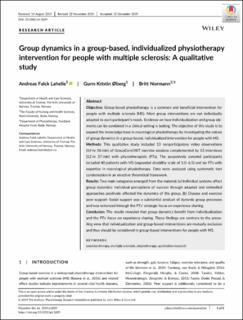| dc.contributor.author | Lahelle, Andreas Falck | |
| dc.contributor.author | Øberg, Gunn Kristin | |
| dc.contributor.author | Normann, Britt | |
| dc.date.accessioned | 2020-07-01T12:29:43Z | |
| dc.date.available | 2020-07-01T12:29:43Z | |
| dc.date.created | 2020-01-14T09:20:22Z | |
| dc.date.issued | 2019 | |
| dc.identifier.citation | Lahelle, A. F., Øberg, G. K. & Normann, B. (2019). Group dynamics in a group‐based, individualized physiotherapy intervention for people with multiple sclerosis: A qualitative study. Physiotherapy Research International, e1829. doi: | en_US |
| dc.identifier.issn | 1471-2865 | |
| dc.identifier.uri | https://hdl.handle.net/11250/2660353 | |
| dc.description.abstract | Objective
Group‐based physiotherapy is a common and beneficial intervention for people with multiple sclerosis (MS). Most group interventions are not individually adapted to each participant's needs. Evidence on how individualization and group elements can be combined in a clinical setting is lacking. The objective of this study is to expand the knowledge base in neurological physiotherapy by investigating the nature of group dynamics in a group‐based, individualized intervention for people with MS.
Methods
This qualitative study included 13 nonparticipatory video observations (14 hr 38 min) of GroupCoreDIST exercise sessions complemented by 13 interviews (12 hr 37 min) with physiotherapists (PTs). The purposively sampled participants included 40 patients with MS (expanded disability scale of 1.0–6.5) and six PTs with expertise in neurological physiotherapy. Data were analysed using systematic text condensation in an enactive theoretical framework.
Results
Two main categories emerged from the material. (a) Individual systems affect group dynamics: Individual perceptions of success through adapted and embodied approaches positively affected the dynamics of the group. (b) Disease and exercise peer support: Social support was a substantial product of dynamic group processes and was enhanced through the PTs' strategic focus on experience sharing.
Conclusion
The results revealed that group dynamics benefit from individualization and the PTs' focus on experience sharing. These findings are contrary to the prevailing view that individualization and group‐based interventions are mutually exclusive and thus should be considered in group‐based interventions for people with MS. | en_US |
| dc.language.iso | eng | en_US |
| dc.publisher | Wiley | en_US |
| dc.rights | Navngivelse 4.0 Internasjonal | * |
| dc.rights.uri | http://creativecommons.org/licenses/by/4.0/deed.no | * |
| dc.title | Group dynamics in a group‐based, individualized physiotherapy intervention for people with multiple sclerosis: A qualitative study | en_US |
| dc.type | Peer reviewed | en_US |
| dc.type | Journal article | en_US |
| dc.description.version | publishedVersion | en_US |
| dc.rights.holder | © 2019 The Author(s) | en_US |
| dc.subject.nsi | VDP::Medisinske Fag: 700::Helsefag: 800::Fysioterapi: 807 | en_US |
| dc.source.pagenumber | 8 | en_US |
| dc.source.journal | Physiotherapy Research International | en_US |
| dc.identifier.doi | 10.1002/pri.1829 | |
| dc.identifier.cristin | 1771985 | |
| dc.description.localcode | Paid Open Access | en_US |

